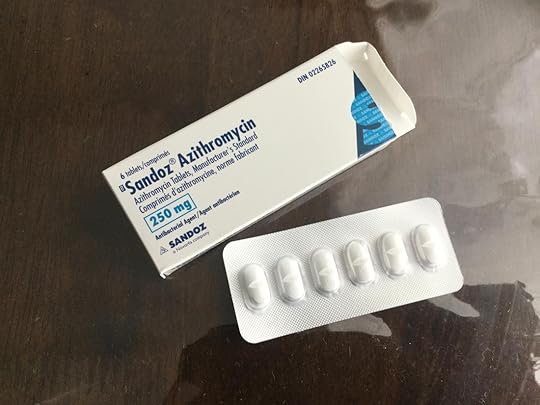Why Mixing Azithromycin and alcohol Makes You Sick
From Medical News Today Azithromycin is a drug that has uses in treating bacterial infections. Mixing with alcohol may cause issues including nausea, headache, and dizziness or other problems.
Nausea, vomiting, or diarrhea

Azithromycin can kill good bacteria in the body and cause stomach problems, such as nausea, vomiting, or diarrhea.
Image credit: Anonymous1941, 2019
Antibiotics, including azithromycin, can cause nausea, vomiting, or diarrhea.
These effects may occur because azithromycin targets all bacteria in the body, including good bacteria in the digestive tract. When the antibiotic eliminates these good bacteria, the digestive system may go out of balance. This can lead to an upset stomach ranging from mild to severe.
Drinking alcohol, on its own, can also cause nausea, vomiting, and diarrhea. Alcohol can irritate the stomach lining, and it increases the production of stomach acid.
Drinking alcohol may also cause spasms of the intestines, which can push stool out too quickly. This can result in diarrhea.
These effects, in combination with azithromycin, can increase the risk of an upset stomach, diarrhea, and feeling unwell.
The body loses essential water and electrolytes when diarrhea occurs. Additionally, because alcohol is a diuretic, it may make these dehydrating effects worse, leading to more side effects.
In addition, if a person vomits soon after taking the medication, their body might not have had time to absorb it. If this happens, a person should call their doctor to discuss whether they need to take another dose.
Headache
One of the potential side effects of azithromycin is a headache. Though headaches do not affect everyone who takes the medication, combining azithromycin with alcohol could increase the risk of a headache or make an existing headache worse.
According to the National Headache Foundation, drinking alcohol can trigger headaches in several different ways. It dilates blood vessels, which can cause pounding and pain, and it leads to dehydration and electrolyte imbalances.
These effects explain why some people experience a hangover with a headache after drinking alcohol.
If a person tries to treat their headache with a pain reliever, they could experience further side effects. Taking nonsteroidal anti-inflammatory drugs, such as aspirin or ibuprofen, may irritate the stomach, causing further digestive upset and nausea.
People should not take acetaminophen with alcohol because it can lead to serious liver problems. This is especially true in people who drink alcohol every day or take high doses of acetaminophen.
Dizziness
Many medical conditions can cause dizziness, or a feeling of spinning when a person is not moving. Dizziness is also a possible side effect of azithromycin.
Dizziness can be bothersome and dangerous if a person needs work, drive, or operate any kind of machinery.
Drinking alcohol can also cause dizziness and could magnify this side effect if a person is also taking azithromycin.
Delayed recovery from illness
Doctors usually prescribe antibiotics for infections that do not clear up on their own. These infections may be severe enough that penicillin will not work well.
The body needs rest and nutrients to fight off infections, and alcohol can interfere with the body’s healing processes.
Alcohol can disrupt sleep, which could make recovery longer and more difficult. Alcohol inhibits rapid eye movement, or REM, sleep, which is the most restorative type of sleep. It also disrupts the body’s natural cues to sleep.
Health professionals usually recommend proper hydration as the body recovers from an infection. Drinking plenty of water can help in recovery and the restoration of energy levels.
As a diuretic, alcohol causes the body to lose water and minerals through the kidneys. This may make a person feel worse as they try to recuperate.
Liver problems

If a person drinks alcohol with azithromycin, then the liver must work harder to process them.
While rare, azithromycin can cause liver problems. Symptoms of liver damage due to azithromycin include:
yellowing of the eyes or skin
nausea or vomiting
dark-colored urine or light-colored stool
extreme fatigue or weakness
stomach pain
loss of appetite
itchiness
The liver also processes alcohol. If a person drinks alcohol with azithromycin, the liver must work harder than usual and could become overworked.
Usually, doctors will not prescribe azithromycin to people who have a history of liver problems.
The post Why Mixing Azithromycin and alcohol Makes You Sick appeared first on Reach Out Recovery.



